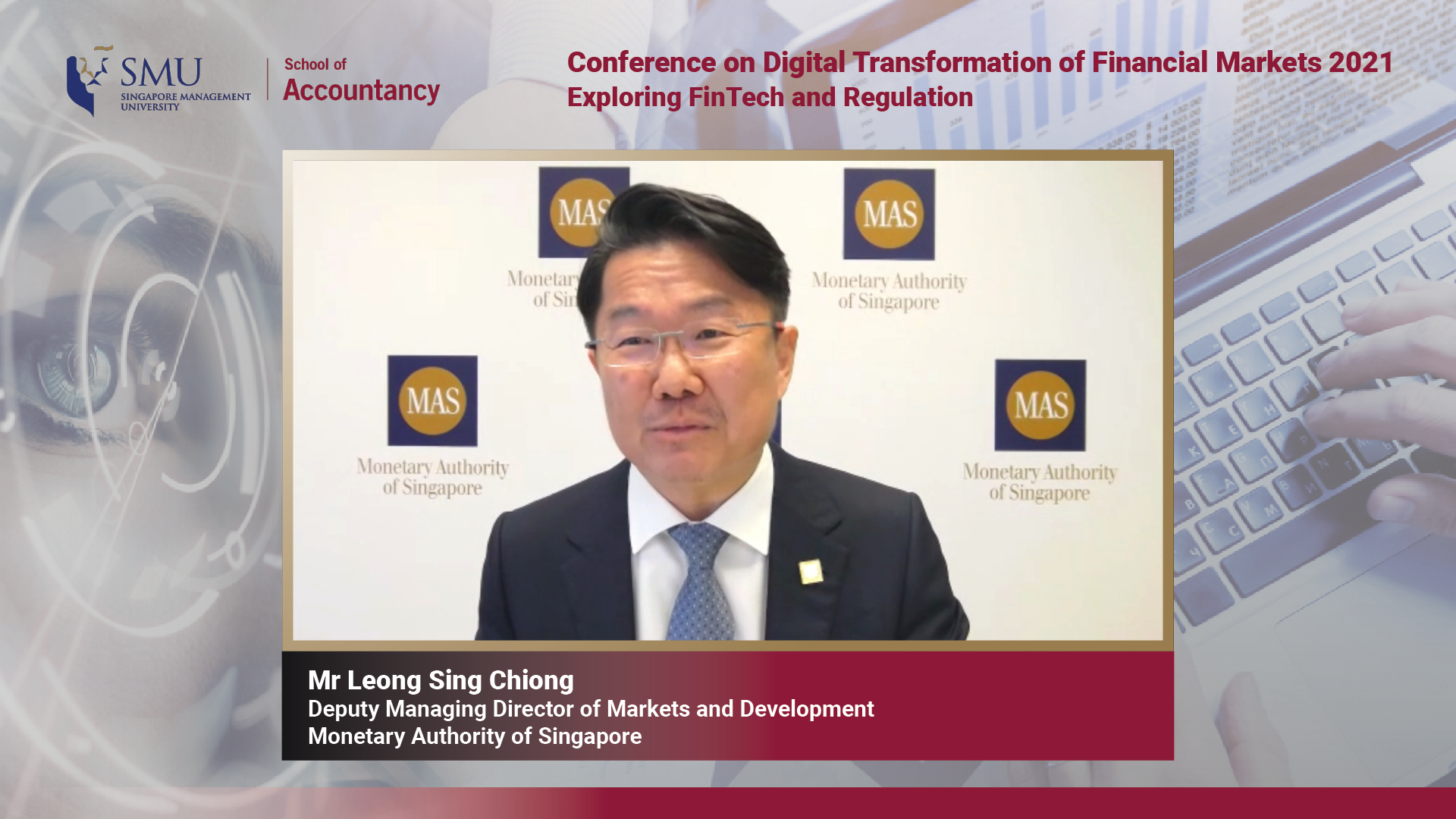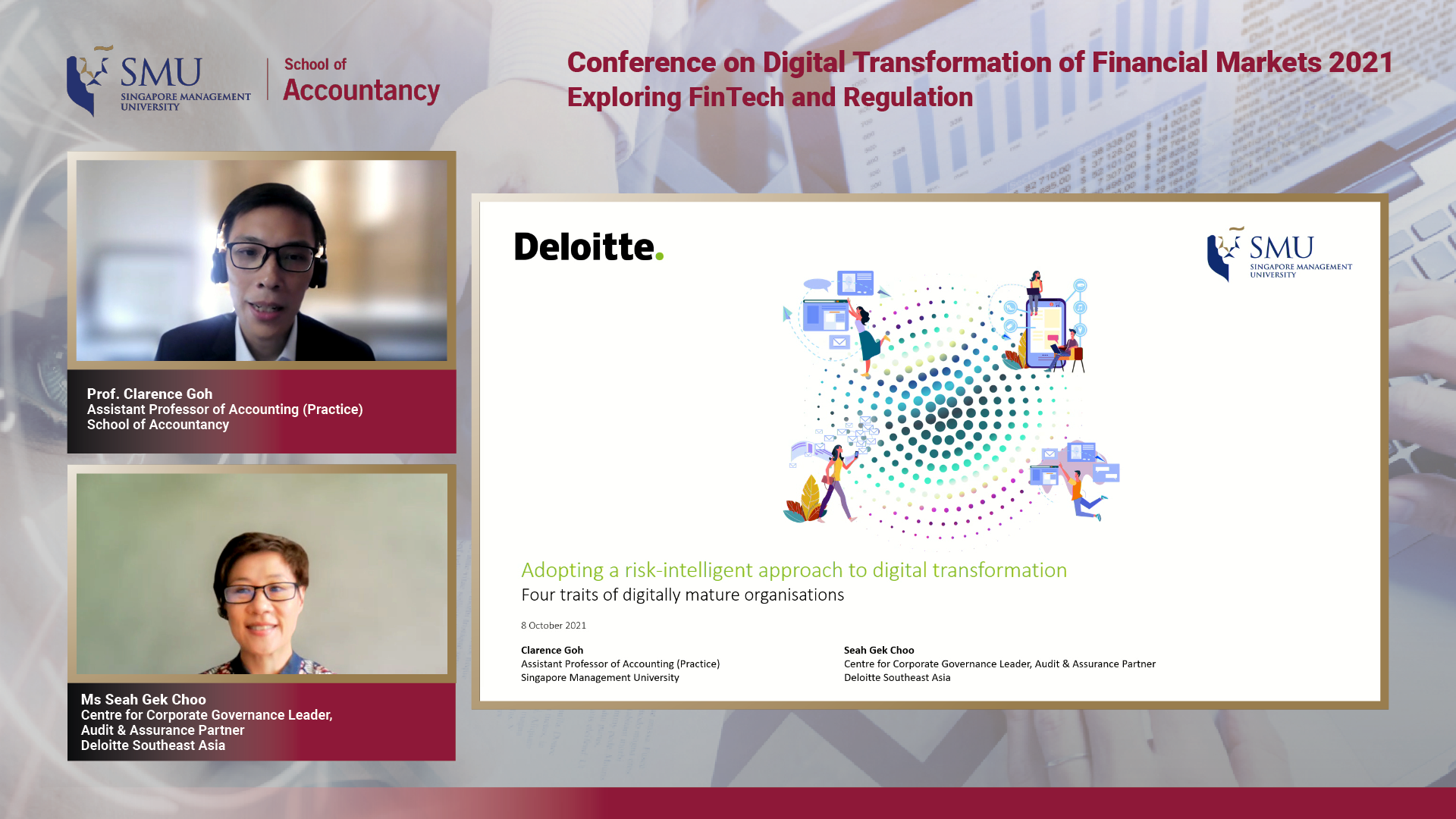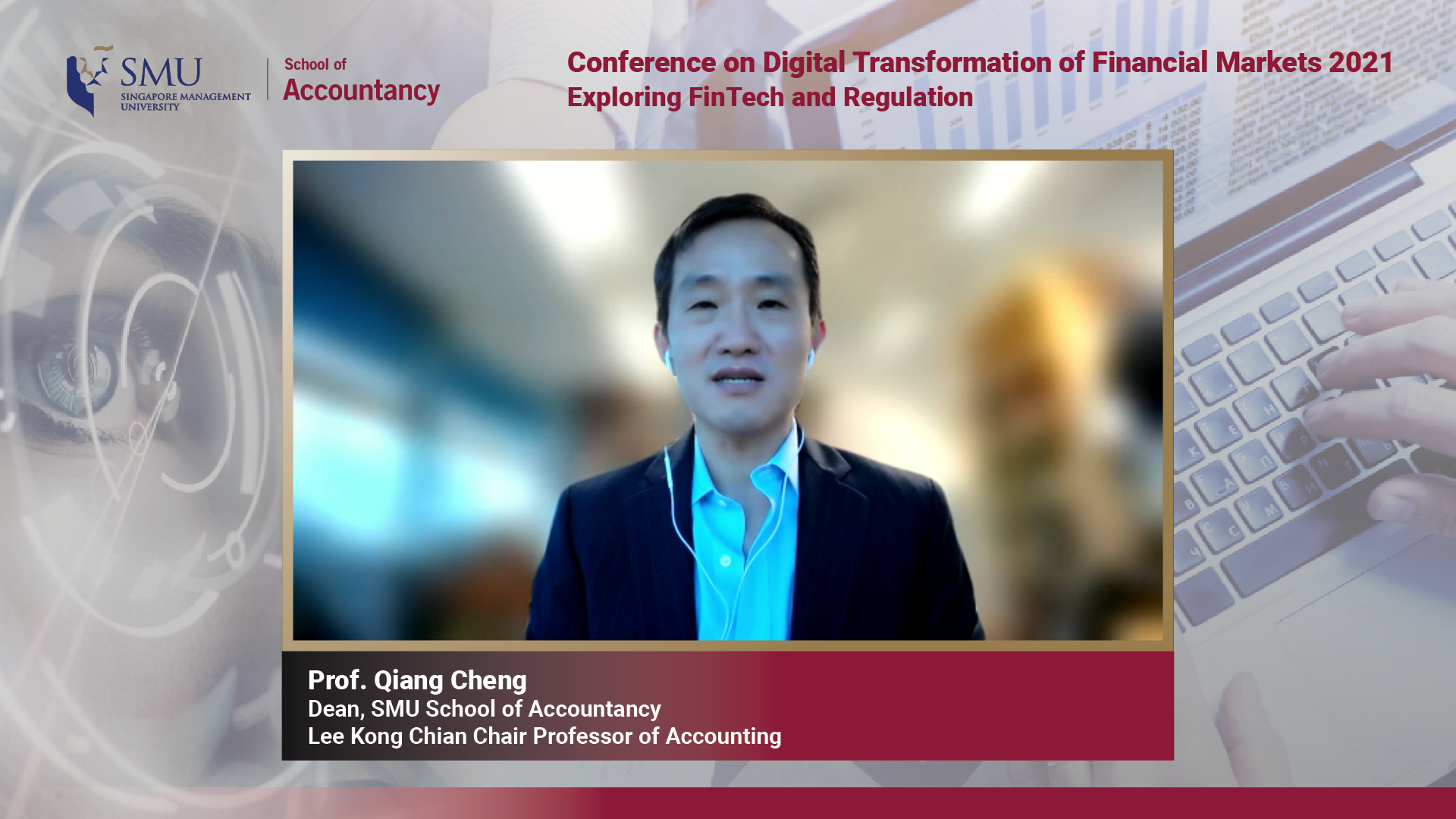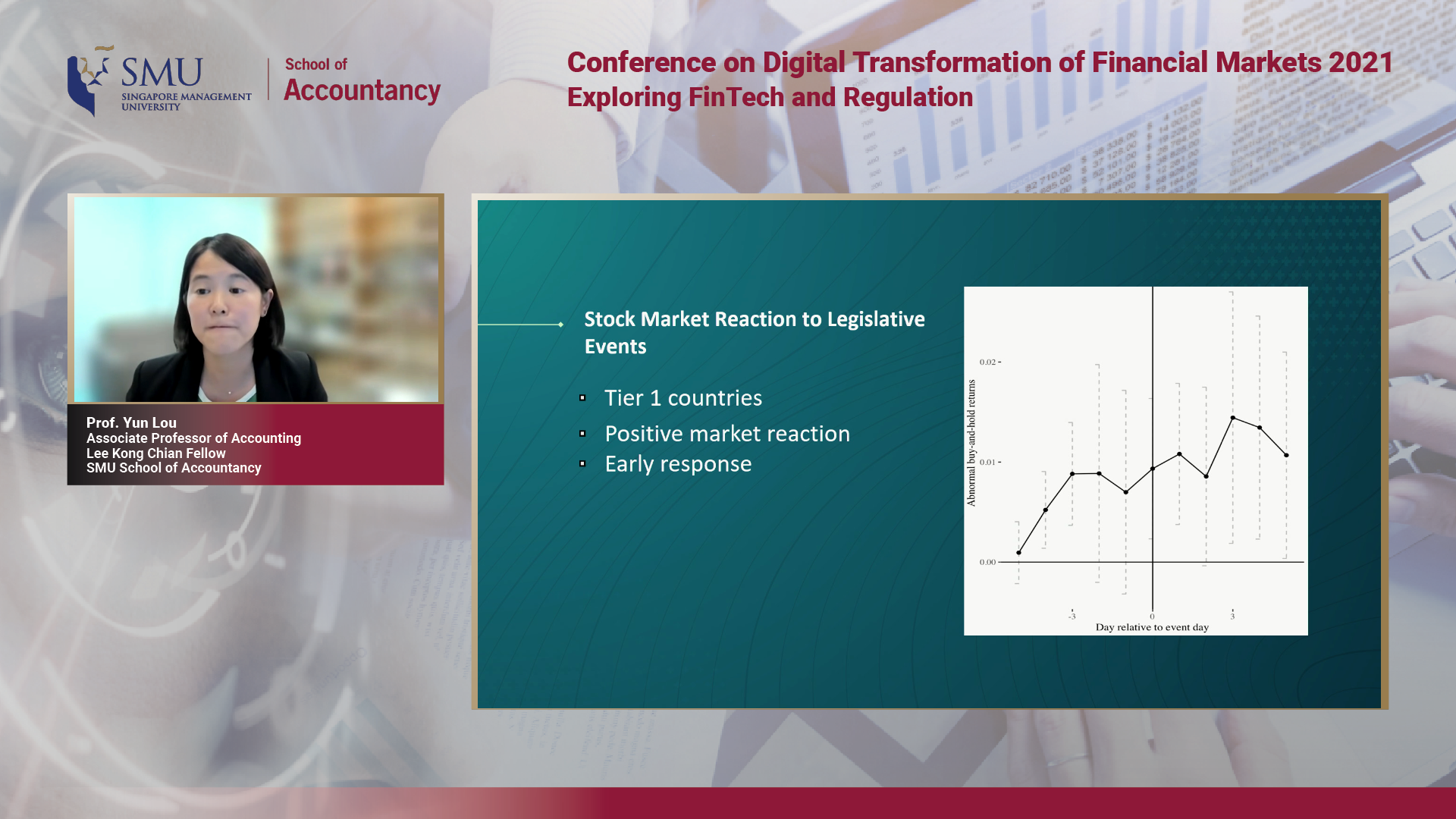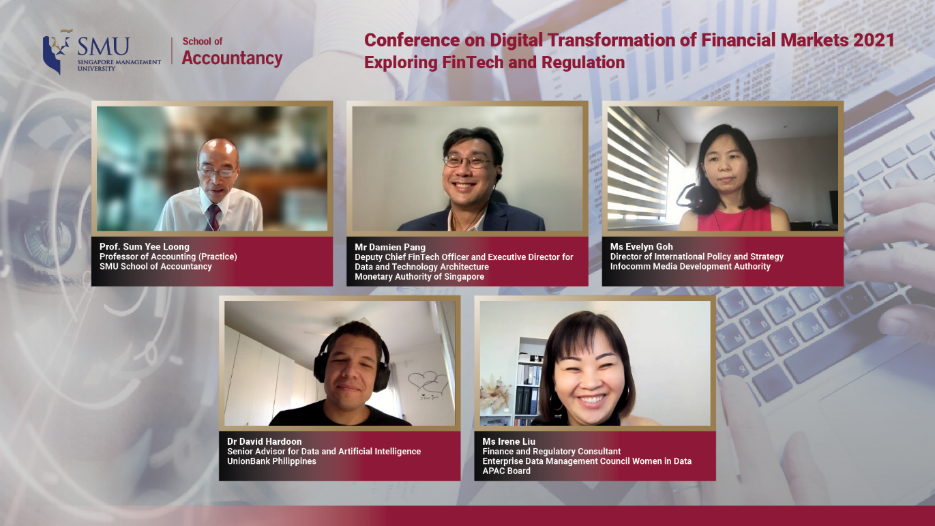
The Singapore Management University’s (SMU) School of Accountancy (SOA) marks its 20th Anniversary this year. As part of its the celebrations, it has published a book, launched the Pang Yang Hoong Scholarship, and hosted an inaugural Conference on Digital Transformation of Financial Markets 2021 on Friday, 8 October 2021 where over 300 industry practitioners in accounting and finance sectors, business owners and regulatory authorities attended the virtual conference.
The far-reaching impact of digital transformation on the future of finance
The financial world is accelerating at a great pace, driven by the emergence of new technologies that present both opportunities and challenges for businesses as they navigate the dynamics of an ever-changing business environment.
“The adoption of new technology has sped up what would typically take three to five years to implement to a matter of months,” observed Professor Timothy Clark, SMU Provost, in his opening remarks at the conference. “Covid and other forces are galvanising the world of finance and moving financial services into a more fully digital era. So how can we navigate the digital transformation of the financial world? What type of regulations are likely to emerge to govern the new competitive landscape?”
Navigating the future of financial services
Mr Leong Sing Chiong, Deputy Managing Director, Markets and Development Group, Monetary Authority of Singapore in his keynote address, reinforced the need to step back and examine the bigger picture, as technology transforms financial services and initiatives are launched at a rapid pace. He said, “We need to ask ourselves, why we are doing all the things that we are doing and be satisfied that we are doing things that matter.”
While Singapore pushes ahead to becoming a leading global financial centre in Asia, it also should not neglect efforts in supporting Asia's development and serving Singapore's economy — especially as Asia increasingly emerges as the centre of gravity of global growth.
“It is not the volume of activities that take place here, but what we are doing as a financial centre to catalyse greater integration within the region to lift collective growth,” says Mr Leong.
He also highlighted the growth in sustainable finance, and the resulting need to capture, analyse and govern disclosures and data. Companies are increasingly producing meaningful and substantive data, both qualitative as well as qualitative, to support measurements of sustainability. There currently exists international platforms that examine the best methods of coordinating risk assessments and disclosures in a more globally consistent manner. However, he noted that the rising trend of sustainable investing also carries risks of greenwashing, especially as the current processes of collecting and measuring data is “very cumbersome, very inefficient, and very manual”.
“The more we can get the region to be more standardised in terms of the standards are adopted, the more we can lend ourselves to sustainability flows coming into the region,” remarked Mr Leong.
With regard to the effects of digital transformation on the financial sector, Mr Leong affirmed that the necessary infrastructure has to be built to allow us to scale and harness the benefits of technology and innovation. Moreover, ensuring cross border connectivity is crucial as the smaller players in sectors like fintech are more likely to make an impact by operating as part of a much larger ecosystem together with other fintech, as well as working with existing incumbents, with whom they can tap on resources to scale their activities.
He concluded: “It is not just about how fast we are at adopting technology, how big we are as a financial centre, but how we apply technology and innovation to solve global pain points, how we harness technology and innovation to catalyse inclusion as well as integration, interoperability — how, Singapore as a financial centre can stay hyper-connected and relevant to the region and the world with digital transformation.”
Governance, risk, and compliance (GRC) aspects of digital transformation
The pandemic has generated a newfound appreciation for the benefits of digital transformation, including its ability to drive new business models, allow efficiencies, and even redefine what we consider to be the very notion of work. To understand how organisations are managing the governance, risk, and compliance (GRC) aspects of their digital transformation programmes, Deloitte Southeast Asia and SMU jointly undertook a set of research in the second and third quarters of 2021.
“The last 18 months have gotten organisational leaders to appreciate just how complex digital transformation programmes can be,” explained Dr Clarence Goh, Assistant Professor of Accounting (Practice), SMU School of Accountancy, and co-author of the GRC in Digital Transformation research together with Ms Seah Gek Choo, Assurance & Advisory Partner, Centre for Corporate Governance and SheXO Programme Leader, Deloitte Singapore.
“They had no choice but to think about how to strike the right balance between reaping the benefits of digital transformation on the one hand, and at the same time figure out how to mitigate the risk of potential losses from insufficient governance and other associated risk and compliance issues.”
The research found that digitally mature organisations or organisations that report more advanced progress in their digital transformation journeys, display four markedly different traits when it comes to managing the GRC aspects of their digital transformation programmes. In particular, they are more likely to recognise the importance of a formal and proactive governance body; regard technological readiness as their weakest governance link; place the ownership of risk identification and monitoring activities with individual business units; and be more acutely aware of the regulatory compliance complexity of their digital transformation programmes.
More information about the report can be found here.
Research Insights
Prof Cheng Qiang, Lee Kong Chian Chair Professor of Accounting, SMU, presented on the research topic of “The Value of Blockchain Applications” where he explored the economic value of blockchain applications through a study of asset-backed securities (ABS) issued in China using blockchain.
“Some people regard blockchain as a hype, which I think is probably related to the volatility of Bitcoin price over time,” shared Professor Qiang during the presentation of his research insights. “Because of the controversy surrounding blockchain applications, a lot of organisations have called for the investigation of the value of blockchain applications.”
Prof Cheng found that compared with other ABS, those issued with blockchain technology experience a decrease of 31.4 basis points in the yield spread, substantial savings for issuers.
Blockchain can address investors’ concerns about the quality of the underlying assets, as it could ensure that the information is reliable and that the issuer cannot change any information stored on the chain, thereby increasing investor confidence.
Dr Yun Lou, Associate Professor of Accounting, SMU School of Accountancy, followed with the second Research Insight presentation on the topic of “Misinformation Regulation and Capital Market Quality”. Prof Lou’s research project evaluates the effectiveness of misinformation regulations, particularly on the capital market, using natural language processing tools.
The study aims to broaden the views of regulators on the potential effects of anti-fake news laws by highlighting how such laws affect not only political processes but also capital markets. By focusing on social media and outcomes on capital markets, specifically, the effect of anti-fake news policies can be evaluated in a measurable and meaningful way by researchers.
The rise of RegTech - Challenges and Opportunities
More than a buzzword, RegTech (regulatory technology) has disrupted the regulatory landscape by providing technologically advanced solutions to the ever-increasing demands of compliance within the financial industry.
The conference culminated in a fireside chat to discuss the issues revolving around RegTech implementation and integration. Moderated by Professor Sum Yee Loong, Professor of Accounting (Practice), SMU, the panellists for the session were Mr Damien Pang, Executive Director (Data and Technology Architecture) and Deputy Chief FinTech Officer, Monetary Authority of Singapore; Evelyn Goh, Director of International Policy and Strategy, Infocomm Media Development Authority; Dr David Hardoon, Senior Advisor for Data and Artificial Intelligence, UnionBank Philippines; and Ms Irene Liu, Finance and Regulatory Consultant, Enterprise Data Management Council Women in Data APAC Board.
Mr Pang began the discussion by emphasising the need to leverage available technologies and fully utilise RegTech tools beyond “tick-the-box compliance”, such that it is a driving force of the business. Likewise, Ms Goh has observed that companies have increased their awareness of RegTech, having adopted more digitally-centric business models and collected more data.
“But a lot of time, awareness does not translate to adoption,” noted Ms Goh. Instead, organisations need to commit by investing in RegTech resources, such as introducing internal policies and governance structure, providing adequate training for employees, and continuously monitoring outcomes to ensure intended goals are achieved.
Moreover, companies often face challenges like the cost of implementing RegTech solutions into legacy systems, and the need to clean up existing data in order to achieve an adequate quality required for RegTech, explained Ms Liu. Another roadblock is the mindset business leaders have of RegTech as simply a cost function and their resulting approach of achieving compliance at the lowest possible cost, added Dr Hardoon. However, he explained that RegTech can be a business enabler: The process of improving data quality also has the ability of improving the level of customer service as much as it could mitigate risks.
Local organisations are currently working with other ASEAN nations, shared Ms Liu, to establish a common data sharing framework. Such data flows also need to be managed to ensure the responsible sharing of information, regulate the privacy of digital assets and also address the fear of contravening laws whilst preserving a business’s competitive edge.
“The region really needs to level up in terms of understanding trusted data flow and sharing, with standards and interoperability being very important factors. After all, data has no borders. It has to flow to have that value,” concluded Ms Goh.
